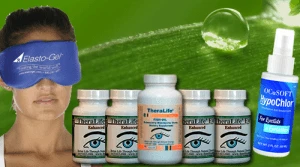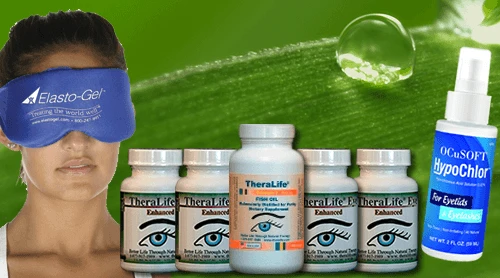Theralife.com offers a range of products that benefit customers by addressing various eye-related issues. For those dealing with eyelid swelling or inflammation, Theralife’s products focus on promoting ocular health through anti-inflammatory pathways. Their natural formulations are designed to tackle conditions such as blepharitis, dry eyes, and uveitis by supporting the body’s inherent healing processes. Theralife emphasizes the use of natural ingredients that align with an anti-inflammatory diet, which can be beneficial for systemic and ocular health. Additionally, their products provide solutions for challenges like eye makeup-related complications, eyelash mites, and recurrent chalazion, ensuring comprehensive care for eye wellness.
Best Blepharitis/Eyelid Swelling Treatment From TheraLife- When Drops Don’t Work.
Key Takeaways
- Turmeric, containing curcumin, offers systemic anti-inflammatory benefits when added to meals, though direct effects on eyelid swelling are unproven.
- Wild-caught salmon is rich in omega-3s that support overall ocular health and may indirectly help reduce systemic inflammation.
- Leafy greens like spinach and kale provide vitamin K and antioxidants, helping control inflammation and contributing to healthier eyelid tissue.
- Blueberries contain anthocyanins and antioxidants that can decrease inflammatory markers and support blood vessel health around the eyes.
- Walnuts deliver plant-based omega-3s (ALA), proteins, and antioxidants, helping regulate systemic inflammation and potentially easing eyelid swelling.
Turmeric: Nature’s Potent Anti-Inflammatory Spice
Although turmeric contains curcumin, a compound studied for anti-inflammatory effects, current clinical evidence doesn’t support its efficacy in reducing eyelid swelling.
You may encounter claims regarding turmeric benefits for various inflammatory conditions, but specifically for eyelid swelling, randomized controlled trials and systematic reviews haven’t demonstrated statistically significant outcomes.
The anti-inflammatory properties of curcumin remain an area of active research, but topical or dietary turmeric hasn’t shown reliable results in the context of periorbital edema.
While incorporating turmeric recipes into your diet may confer general systemic benefits—such as mild reduction in certain inflammatory markers—this shouldn’t be interpreted as a targeted intervention for eyelid swelling.
It’s essential to distinguish anecdotal reports from evidence-based protocols when considering turmeric benefits for ocular inflammation.
For effective management of conditions like blepharitis, it is recommended to use hot compresses to unclog meibomian glands which can aid in normal gland function and provide relief.
Wild-Caught Salmon: Omega-3 Rich Support for Eye Health
While wild-caught salmon is a rich source of omega-3 fatty acids—particularly EPA and DHA, which have been linked to anti-inflammatory effects in systemic conditions—current research doesn’t support a direct or clinically significant impact of these nutrients on eyelid swelling (periorbital edema).
You might encounter claims connecting salmon recipes and omega 3 benefits to improved periocular inflammation, but the evidence remains insufficient for such specific outcomes.
However, incorporating wild-caught salmon into your diet offers measurable systemic omega-3 benefits. Consider the following:
- High bioavailability of omega-3s (EPA/DHA)
- Protein-dense, supporting overall ocular structure
- Low in saturated fats and environmental toxins (relative to farmed salmon)
- May benefit cardiovascular and systemic inflammatory status
- Versatile for creating nutrient-rich, healthy meal options
Prioritize evidence-based approaches when addressing eyelid swelling. Integration of omega-3 from sources like wild-caught salmon can help maintain eye health by supporting retinal function and reducing inflammation.
Leafy Greens: Nutrient-Dense Allies Against Swelling
Several varieties of leafy greens—such as spinach, kale, and Swiss chard—are densely packed with micronutrients relevant to inflammation modulation, including vitamin K, vitamin C, lutein, and beta-carotene.
You gain anti-inflammatory benefits when you include these leafy greens in your diet, as each micronutrient supports cellular processes that mitigate the cascade of inflammatory mediators implicated in eyelid swelling.
Vitamin K helps regulate pro-inflammatory cytokine expression, while vitamin C acts as a potent antioxidant, reducing oxidative stress within eyelid tissues. Lutein and beta-carotene further fortify cellular membranes, protecting against inflammatory insults.
Ideal nutrient absorption occurs when you consume leafy greens with modest amounts of healthy fats, such as olive oil. Consistent dietary intake improves your eyelid’s resilience to edema and related inflammatory responses.
For those experiencing dry eye conditions, maintaining a balanced diet rich in nutrients can also contribute to alleviating symptoms and supporting overall eye health.
Blueberries: Antioxidant Powerhouses for Soothing Inflammation
Blueberries offer a concentrated source of anthocyanins, which are bioactive compounds known to inhibit pro-inflammatory signaling pathways. When you incorporate blueberries into your diet, you’re providing your body with polyphenols that neutralize oxidative stress, a key contributor to eyelid swelling. Clinical studies demonstrate that regular blueberry consumption can lead to measurable reductions in inflammatory biomarkers. You can enhance both taste and efficacy by preparing blueberry smoothies, optimizing absorption of their antioxidant benefits. Rich in anthocyanins, targeting inflammatory mediators. Low in calories, facilitating regular consumption without caloric excess. Polyphenol content supports endothelial function and vascular health. Easily included in your routine through blueberry smoothies. Shown in evidence-based research to reduce C-reactive protein (CRP) levels. Chronic dry eyes exacerbate inflammation and discomfort, and addressing underlying issues can provide relief. Harnessing blueberry antioxidant benefits aids in mitigating eyelid inflammation using clinically validated mechanisms.
Walnuts: Plant-Based Omega-3s for Calmer Eyelids
Walnuts deliver a concentrated source of alpha-linolenic acid (ALA), a plant-derived omega-3 fatty acid shown to modulate pro-inflammatory cytokine production. By integrating walnuts into your daily nutrition, you gain access to one of the most effective omega 3 sources from plants. Clinical studies demonstrate that consistent ALA intake can restrain inflammatory pathways, decrease prostaglandin synthesis, and thereby help reduce eyelid swelling. Emphasizing walnut benefits, this nut offers a synergistic profile of antioxidants, protein, and trace minerals which further support immune homeostasis. Omega-3s, particularly DHA and EPA, are essential fatty acids that are vital for overall health and cell function.
| Daily Serving | Clinical Effect |
|---|---|
| 1 oz walnuts | Modulates inflammation |
| 2 oz walnuts | Enhances lipid profiles |
| 3 oz walnuts | Increases ALA absorption |
Utilize walnuts as a potent dietary intervention for eyelid comfort and systemic inflammation regulation.
Best Blepharitis/Eyelid Swelling Treatment From TheraLife- When Drops Don’t Work.
Frequently Asked Questions
Can Eyelid Swelling Be Caused by Allergies or Infections?
Yes, you can experience eyelid swelling due to both allergy triggers and infection signs.
Allergy triggers, such as pollen or dust mites, provoke an immune response causing rapid, painless eyelid edema with itching.
In contrast, infection signs often include localized redness, warmth, tenderness, and sometimes discharge, indicating bacterial or viral involvement.
If you notice persistent or worsening swelling, you should consult a healthcare provider for precise diagnosis and evidence-based management.
Are There Home Remedies to Reduce Eyelid Swelling Quickly?
You can use several natural treatments to reduce eyelid swelling quickly.
Applying a cool compress constricts local blood vessels, reducing edema. Saline eye washes may flush out irritants.
Among herbal remedies, chamomile tea bags (cooled) provide localized anti-inflammatory effects due to apigenin content.
Always verify the treatment is sterile to prevent infection, and monitor for persistent or worsening symptoms, as these may necessitate prompt medical evaluation to rule out serious underlying conditions.
When Should I See a Doctor About Swollen Eyelids?
You should see a doctor about swollen eyelids if symptom severity increases, such as developing vision changes, intense pain, or persistent redness.
Rapid swelling, discharge, or fever suggest underlying conditions like infection or orbital cellulitis that require prompt evaluation.
Chronic or recurrent eyelid swelling may indicate allergy or systemic disease.
Clinically, persistent or worsening symptoms signal a need for evidence-based medical assessment and intervention to rule out serious or sight-threatening etiologies.
Do Cold Compresses Help With Eyelid Swelling?
Think of a cold compress as a calm blanket putting out the fire of inflammation in your eyelid.
Using cold treatment for eyelid swelling constricts blood vessels, which reduces edema and numbs discomfort—core elements of effective eyelid care.
Scientific evidence supports this practice as a first-line, non-invasive intervention for mild swelling.
Apply a clean, chilled compress for 10-15 minutes several times daily, taking care not to freeze or irritate the delicate periorbital skin.
Can Dehydration Contribute to Eyelid Inflammation?
Yes, dehydration can contribute to eyelid inflammation because inadequate hydration disrupts tear film stability, increasing ocular surface irritation.
When you experience dehydration symptoms, such as dry mouth or reduced urination, your eyelid health may also suffer.
Insufficient fluid intake affects meibomian gland function, impairing lipid layer production and exacerbating inflammation.
Clinical evidence supports proper hydration as essential for maintaining ideal eyelid health and preventing inflammatory responses in periocular tissues.
Best Blepharitis/Eyelid Swelling Treatment From TheraLife- When Drops Don’t Work.
Conclusion
TheraLife offers a range of products designed to benefit individuals suffering from various eye conditions, including swollen eyelids, blepharitis, and dry eyes. Rather than relying solely on traditional medical treatments, TheraLife emphasizes the importance of diet and lifestyle changes. Their products are crafted to support systemic immune modulation, helping to reduce inflammation naturally. By incorporating essential nutrients and focusing on an anti-inflammatory diet, TheraLife empowers its customers to manage their symptoms effectively. Whether dealing with periorbital edema or other eye-related issues, TheraLife provides a holistic approach that aligns with modern wellness practices.





